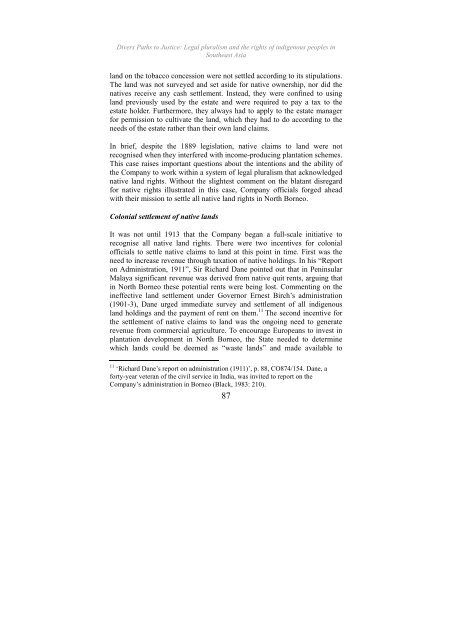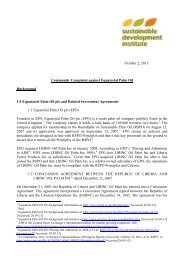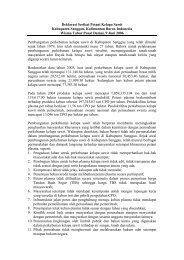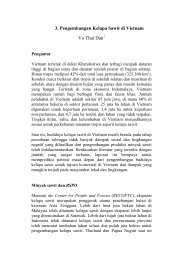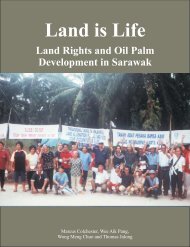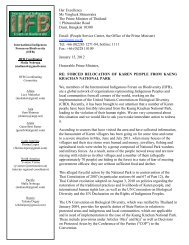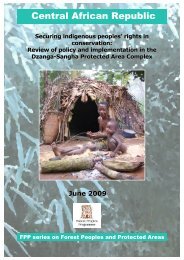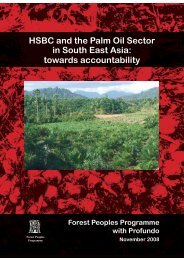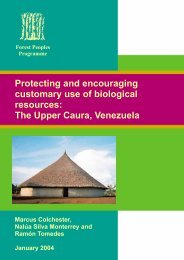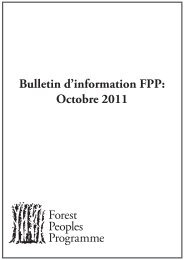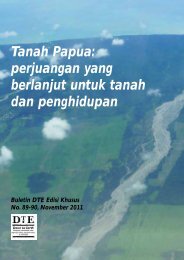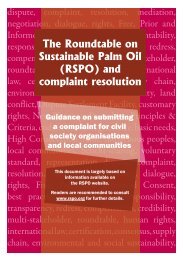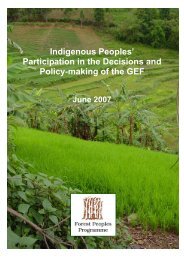Divers Paths to Justice - English - Forest Peoples Programme
Divers Paths to Justice - English - Forest Peoples Programme
Divers Paths to Justice - English - Forest Peoples Programme
Create successful ePaper yourself
Turn your PDF publications into a flip-book with our unique Google optimized e-Paper software.
<strong>Divers</strong> <strong>Paths</strong> <strong>to</strong> <strong>Justice</strong>: Legal pluralism and the rights of indigenous peoples inSoutheast Asialand on the <strong>to</strong>bacco concession were not settled according <strong>to</strong> its stipulations.The land was not surveyed and set aside for native ownership, nor did thenatives receive any cash settlement. Instead, they were confined <strong>to</strong> usingland previously used by the estate and were required <strong>to</strong> pay a tax <strong>to</strong> theestate holder. Furthermore, they always had <strong>to</strong> apply <strong>to</strong> the estate managerfor permission <strong>to</strong> cultivate the land, which they had <strong>to</strong> do according <strong>to</strong> theneeds of the estate rather than their own land claims.In brief, despite the 1889 legislation, native claims <strong>to</strong> land were notrecognised when they interfered with income-producing plantation schemes.This case raises important questions about the intentions and the ability ofthe Company <strong>to</strong> work within a system of legal pluralism that acknowledgednative land rights. Without the slightest comment on the blatant disregardfor native rights illustrated in this case, Company officials forged aheadwith their mission <strong>to</strong> settle all native land rights in North Borneo.Colonial settlement of native landsIt was not until 1913 that the Company began a full-scale initiative <strong>to</strong>recognise all native land rights. There were two incentives for colonialofficials <strong>to</strong> settle native claims <strong>to</strong> land at this point in time. First was theneed <strong>to</strong> increase revenue through taxation of native holdings. In his “Repor<strong>to</strong>n Administration, 1911”, Sir Richard Dane pointed out that in PeninsularMalaya significant revenue was derived from native quit rents, arguing thatin North Borneo these potential rents were being lost. Commenting on theineffective land settlement under Governor Ernest Birch’s administration(1901-3), Dane urged immediate survey and settlement of all indigenousland holdings and the payment of rent on them. 11 The second incentive forthe settlement of native claims <strong>to</strong> land was the ongoing need <strong>to</strong> generaterevenue from commercial agriculture. To encourage Europeans <strong>to</strong> invest inplantation development in North Borneo, the State needed <strong>to</strong> determinewhich lands could be deemed as “waste lands” and made available <strong>to</strong>11 ‘Richard Dane’s report on administration (1911)’, p. 88, CO874/154. Dane, aforty-year veteran of the civil service in India, was invited <strong>to</strong> report on theCompany’s administration in Borneo (Black, 1983: 210).87


